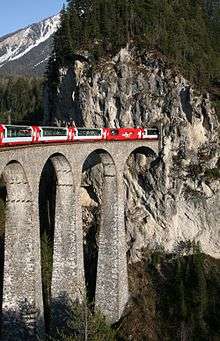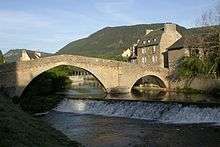bridge
English

Alternative forms
- bridg (obsolete)
Pronunciation
- enPR: brĭj, IPA(key): /bɹɪd͡ʒ/
Audio (US) (file) - Rhymes: -ɪdʒ
Etymology 1
From Middle English brigge, from Old English brycġ (“bridge”), from Proto-Germanic *brugjō, *brugjǭ (“bridge”), from Proto-Indo-European *bʰerw-, *bʰrēw- (“wooden flooring, decking, bridge”).
Cognate with Scots brig, brigg, breeg (“bridge”), Saterland Frisian Brääch (“bridge”), West Frisian brêge (“bridge”), Dutch brug (“bridge”), German Brücke (“bridge”), Danish bro (“bridge”) and brygge (“wharf”), Icelandic brú (“bridge”) and brygga (“pier”), Gaulish bríva (“bridge”), Serbo-Croatian brv (“bridge, crossbar”), Old Church Slavonic бръвъно (brŭvŭno, “beam”) and Russian бревно́ (brevnó, “log”).
The verb is from Middle English briggen, from Old English brycġian (“to bridge, make a causeway, pave”), derived from the noun. Cognate with Dutch bruggen (“to bridge”), Middle Low German bruggen (“to bridge”), Old High German bruccōn (“to bridge”) (whence Modern German brücken).
Noun


bridge (plural bridges)
- A construction or natural feature that spans a divide.
- A construction spanning a waterway, ravine, or valley from an elevated height, allowing for the passage of vehicles, pedestrians, trains, etc.
- The rope bridge crosses the river.
- 1898, Winston Churchill, chapter 8, in The Celebrity:
- Now we plunged into a deep shade with the boughs lacing each other overhead, and crossed dainty, rustic bridges over the cold trout-streams, the boards giving back the clatter of our horses' feet: or anon we shot into a clearing, with a colored glimpse of the lake and its curving shore far below us.
- 2013 June 29, “High and wet”, in The Economist, volume 407, number 8842, page 28:
- Floods in northern India, mostly in the small state of Uttarakhand, have wrought disaster on an enormous scale. The early, intense onset of the monsoon on June 14th swelled rivers, washing away roads, bridges, hotels and even whole villages. Rock-filled torrents smashed vehicles and homes, burying victims under rubble and sludge.
- (anatomy) The upper bony ridge of the human nose.
- Rugby players often break the bridge of their noses.
- (dentistry) A prosthesis replacing one or several adjacent teeth.
- The dentist pulled out the decayed tooth and put in a bridge.
- (bowling) The gap between the holes on a bowling ball
- A construction spanning a waterway, ravine, or valley from an elevated height, allowing for the passage of vehicles, pedestrians, trains, etc.
- An arch or superstructure.
- (nautical) An elevated platform above the upper deck of a mechanically propelled ship from which it is navigated and from which all activities on deck can be seen and controlled by the captain, etc; smaller ships have a wheelhouse, and sailing ships were controlled from a quarterdeck.
- The first officer is on the bridge.
- (music, lutherie) The piece, on string instruments, that supports the strings from the sounding board.
- (billiards, snooker, pool) A particular form of one hand placed on the table to support the cue when making a shot in cue sports.
- (billiards, snooker, pool) A cue modified with a convex arch-shaped notched head attached to the narrow end, used to support a player's (shooter's) cue for extended or tedious shots. Also called a spider.
- Anything supported at the ends and serving to keep some other thing from resting upon the object spanned, as in engraving, watchmaking, etc., or which forms a platform or staging over which something passes or is conveyed.
- (wrestling) A defensive position in which the wrestler is supported by his feet and head, belly-up, in order to prevent touch-down of the shoulders and eventually to dislodge an opponent who has established a position on top.
- (gymnastics) A similar position in gymnastics.
- (nautical) An elevated platform above the upper deck of a mechanically propelled ship from which it is navigated and from which all activities on deck can be seen and controlled by the captain, etc; smaller ships have a wheelhouse, and sailing ships were controlled from a quarterdeck.
- A connection, real or abstract.
- (medicine) A rudimentary procedure before definite solution
- ECMO is used as a bridge to surgery to stabilize the patient.
- (computing) A device which connects two or more computer buses, typically in a transparent manner.
- This chip is the bridge between the front-side bus and the I/O bus.
- (communication) A system which connects two or more local area networks at layer 2.
- The LAN bridge uses a spanning tree algorithm.
- (chemistry) An intramolecular valence bond, atom or chain of atoms that connects two different parts of a molecule; the atoms so connected being bridgeheads.
- (electronics) An unintended solder connection between two or more components or pins.
- (music) A song contained within another song, often demarcated by meter, key, or melody.
- The lyrics in the song's bridge inverted its meaning.
- (graph theory) An edge which, if removed, changes a connected graph to one that is not connected.
- (poetry) A point in a line where a break in a word unit cannot occur.
- (diplomacy) A statement, such as an offer, that signals a possibility of accord.
- A day falling between two public holidays and consequently designated as an additional holiday.
- (medicine) A rudimentary procedure before definite solution
- (electronics) Any of several electrical devices that measure characteristics such as impedance and inductance by balancing different parts of a circuit
- A low wall or vertical partition in the fire chamber of a furnace, for deflecting flame, etc.; a bridge wall.
- (cycling) The situation where a lone rider or small group of riders closes the space between them and the rider or group in front.
- A solid crust of undissolved salt in a water softener.
Derived terms
- Appley Bridge
- Bailey bridge
- bridge loan
- bridge mount
- bridge over troubled waters
- bridge route
- bridge the gap
- covered bridge
- cross that bridge when one comes to it
- drawbridge
- footbridge
- Hebden Bridge
- humpback bridge
- ice bridge
- Ivybridge
- Kelvin bridge
- land bridge
- low bridge
- Maryland bridge
- Schering bridge
- suspension bridge
- Sutton Bridge
- swing bridge, swingbridge
- water under the bridge
- Weybridge
- Wheatstone bridge
- Wien bridge
Translations
|
|
|
|
|
|
|
Verb
bridge (third-person singular simple present bridges, present participle bridging, simple past and past participle bridged)
- To be or make a bridge over something.
- With enough cable, we can bridge this gorge.
- To span as if with a bridge.
- 2012, Christoper Zara, Tortured Artists: From Picasso and Monroe to Warhol and Winehouse, the Twisted Secrets of the World's Most Creative Minds, part 1, chapter 1, 28:
- The brooding, black-clad singer bridged a stark divide that emerged in the recording industry in the 1950s, as post-Elvis pop singers diverged into two camps and audiences aligned themselves with either the sideburned rebels of rock 'n' roll or the cowboy-hatted twangsters of country music.
- The two groups were able to bridge their differences.
- 2012, Christoper Zara, Tortured Artists: From Picasso and Monroe to Warhol and Winehouse, the Twisted Secrets of the World's Most Creative Minds, part 1, chapter 1, 28:
- (music) To transition from one piece or section of music to another without stopping.
- We need to bridge that jam into "The Eleven".
- (computing, communication) To connect two or more computer buses, networks etc. with a bridge.
- (wrestling) To go to the bridge position.
Translations
|
|
|
|
|
Etymology 2
From the earlier form (name of an older card game) biritch, probably from Russian бири́ч (biríč) (per the OED), or else from Turkish bir-üç, "one-three".[1][2]
Noun
bridge (uncountable)
- (card games) A card game played with four players playing as two teams of two players each.
- Bidding is an essential element of the game of bridge.
Translations
|
|
References
- "bridge." *OED 2nd edition. 1989. (online)
- "bridge." Online Etymology Dictionary. 2008.
Dutch
Pronunciation
Audio (file)
Finnish
Pronunciation
- IPA(key): /ˈbridɡe/, [ˈbridɡe̞]
Declension
| Inflection of bridge (Kotus type 8/nalle, no gradation) | |||
|---|---|---|---|
| nominative | bridge | bridget | |
| genitive | bridgen | bridgejen | |
| partitive | bridgeä | bridgejä | |
| illative | bridgeen | bridgeihin | |
| singular | plural | ||
| nominative | bridge | bridget | |
| accusative | nom. | bridge | bridget |
| gen. | bridgen | ||
| genitive | bridgen | bridgejen bridgeinrare | |
| partitive | bridgeä | bridgejä | |
| inessive | bridgessä | bridgeissä | |
| elative | bridgestä | bridgeistä | |
| illative | bridgeen | bridgeihin | |
| adessive | bridgellä | bridgeillä | |
| ablative | bridgeltä | bridgeiltä | |
| allative | bridgelle | bridgeille | |
| essive | bridgenä | bridgeinä | |
| translative | bridgeksi | bridgeiksi | |
| instructive | — | bridgein | |
| abessive | bridgettä | bridgeittä | |
| comitative | — | bridgeineen | |
French
Pronunciation
- IPA(key): /bʁidʒ/
Synonyms
- (dentistry): pont (Canada)
Further reading
- “bridge” in le Trésor de la langue française informatisé (The Digitized Treasury of the French Language).
Italian
Norwegian Bokmål
Norwegian Nynorsk
Portuguese
Spanish
Pronunciation
- IPA(key): /ˈbɾit͡ʃ/
Swedish
Etymology
From English.
Declension
| Declension of bridge | ||||
|---|---|---|---|---|
| Uncountable | ||||
| Indefinite | Definite | |||
| Nominative | bridge | bridgen | — | — |
| Genitive | bridges | bridgens | — | — |
Related terms
- bridgekväll
- bridgespelare
- bridgetävling